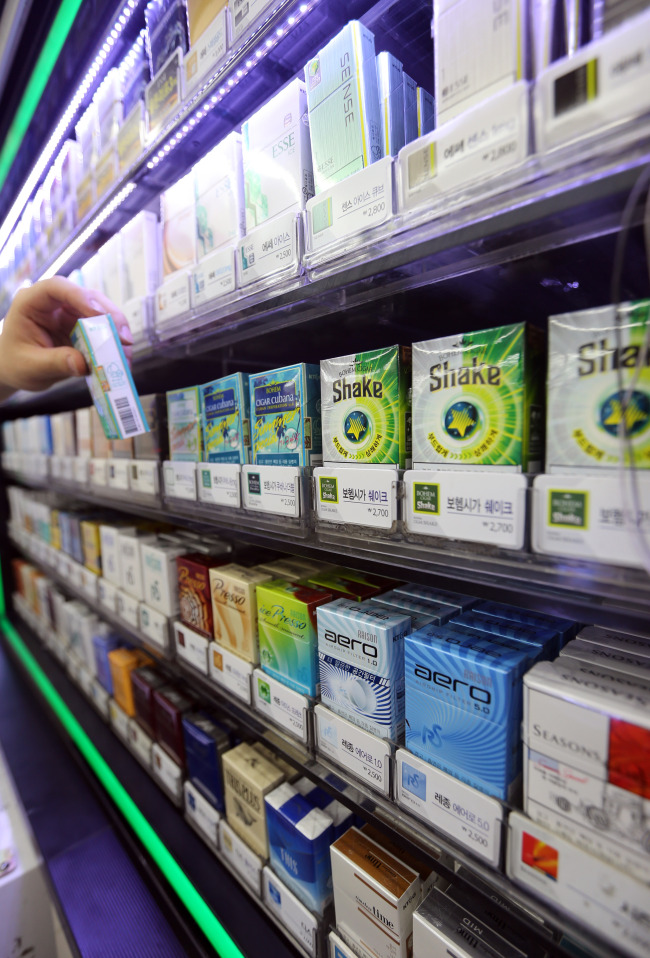The South Korean government appears to be considering a hike in cigarette prices in a move to cut the nation’s smoking rate.
The tobacco tax increase, if it materializes, would also be a part of the government’s plans to raise more taxes to cover welfare costs, according to Deputy Prime Minister and Finance Minister nominee Choi Kyung-hwan.
“We may need to increase taxation on cigarettes for the sake of public health,” he said in a statement submitted ahead of his confirmation hearing Tuesday.
His remarks come as the Health Ministry is actively calling for an increase to the cigarette tax, which has gone unchanged for nearly a decade.
Until Choi appeared on the scene, the Finance Ministry has been opposed to the cigarette tax, saying it could stoke inflation.
 |
Cigarettes are displayed at a convenience store in Seoul. (Yonhap) |
Hyun Oh-seok, the outgoing finance minister, said earlier that raising cigarette prices could lead to inflation in consumer prices, and increase the tax burden on those with smaller incomes.
The last time South Korea had revised its tobacco tax was in 2004. Korea is now one of the cheapest places to buy cigarettes in the world.
A pack of cigarettes costs about $2.50, the lowest among 34 OECD economies, according to a recent study by the World Health Organization.
Norway has the highest price of $14.40 per pack, followed by Ireland and New Zealand with $11.90 and $11.60 respectively, the report said.
The Ministry of Health and Welfare blames the cheap cigarettes for the country’s high smoking rate ― nearly 4 out of 10 Korean men aged 15 or older smoke every day, which, which is the second-highest rate among OECD members, after Greece.
According to a recent WHO study, an increase in tobacco prices by 50 percent would help to avoid 4 million deaths and get 3 million to quit smoking worldwide.
Citing a strong recommendation from the WHO, the Health Ministry announced recently that it would push to raise the value-added tax on cigarettes by up to 50 percent.
The ministry said it would pass a revised bill by early next year following related negotiations with the Finance Ministry.
Experts say higher cigarettes taxes would also help the government raise tax revenues and reduce its fiscal deficit.
Rep. Kim Jae-won of the ruling Saenuri Party, who submitted a revision bill in 2013 calling for retail cigarette price hikes, said that if the average cigarette price increased to 4,500 won from 2,500 won, it would bring in more than 3 trillion won ($2.9 billion) in extra tax revenue.
But some are concerned about whether the tax hike could effectively discourage tobacco use and prevent young people from becoming addicted to cigarettes.
“Price increases can be an effective tool in the short term, but they alone can’t help people quit smoking,” said an official from the Korea Health Promotion Foundation.
In addition to a price increase, the government should introduce strict antismoking policies, such as requiring tobacco producers to put graphic and visual warnings on cigarette packages, as well as putting more anti-smoking advertisements on TV, she added.
By Oh Kyu-wook (
596story@heraldcorp.com)





![[Exclusive] Hyundai Mobis eyes closer ties with BYD](http://res.heraldm.com/phpwas/restmb_idxmake.php?idx=644&simg=/content/image/2024/11/25/20241125050044_0.jpg)
![[Herald Review] 'Gangnam B-Side' combines social realism with masterful suspense, performance](http://res.heraldm.com/phpwas/restmb_idxmake.php?idx=644&simg=/content/image/2024/11/25/20241125050072_0.jpg)

